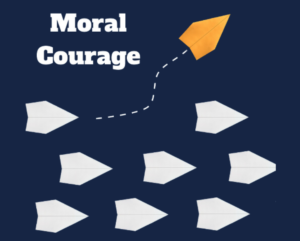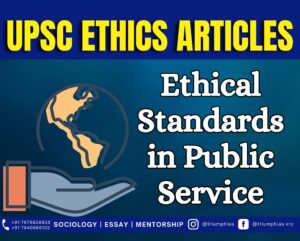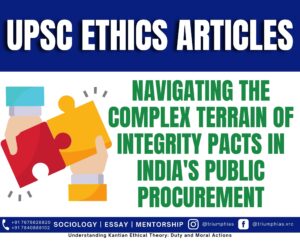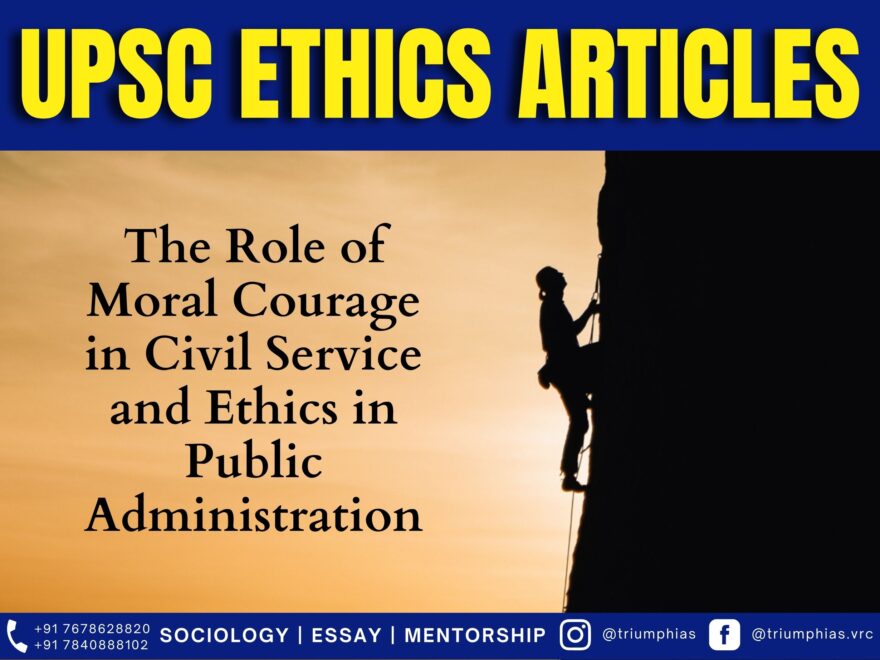Moral Courage
[Relevant for Public Ethics, Integrity and Aptitude]

Moral Courage
Moral courage constitutes a vital quality that empowers individuals to uphold their principles and champion what is right, even in challenging circumstances or in the presence of opposition. Within the realm of civil service, possessing moral courage is a crucial characteristic that empowers civil servants to maintain their ethical and professional standards, even when confronted with intricate and occasionally politically sensitive decisions.
What are morals
Derived from the Latin word “moralis,” signifying “traditional customs.”
- Morals encompass the social, cultural, and religious beliefs or values held by an individual or group, dictating what is right or wrong. For instance, refraining from cheating and always telling the truth are examples.
- Morals are the principles that steer individual behavior within society.
Courage
“Courage to accept and dedication to improve are two keys to success.” – Essay, 2019
“Courage is the most crucial of all virtues because, without courage, you cannot consistently practice any other virtue.” – Maya Angelou
- The mind serves as humanity’s greatest weapon by distinguishing between danger and opportunities.
- Courage involves the choice and willingness to confront agony, pain, danger, uncertainty, or intimidation with composure and the moral conviction that supports necessary and ethically correct action. Courage extends beyond physical bravery.
NEED OF ETHICS IN PUBLIC ADMINISTRATIONPublic administration in India has traditionally concentrated on political, legal, and financial aspects, but the ethical dimension is equally crucial, as illustrated by the following points:
Example – Implementation of the Bonded Labour Abolition Act by IAS officer S. Shankaran. |
Moral courage is the readiness to do what is right, irrespective of the consequences. It entails standing firm in one’s principles and convictions, even in the face of pressure or opposition from others. This demands individuals to have confidence in their values, beliefs, and judgment and to act on them, even when the situation is difficult or uncomfortable.
Moral courage is distinct from physical courage. While physical courage involves confronting physical danger, moral courage entails confronting ethical or moral challenges. It necessitates individuals to possess a robust sense of personal integrity and to be ready to speak out against injustice or wrongdoing, even if it means jeopardizing their reputation, career, or personal safety.
Importance of moral courage
- High Ethical Standards: Civil servants are anticipated to uphold elevated ethical and professional standards in their roles. Frequently, they are confronted with challenging decisions that necessitate the delicate balance of competing interests and values.
- In such circumstances, moral courage becomes imperative for civil servants to act in the public interest, even if it involves opposing the interests of powerful individuals or groups.
- Impact on Masses: Notably, moral courage holds heightened significance for civil servants due to the substantial impacts their decisions can have on people’s lives. Their role involves implementing policies and programs that directly influence public welfare, and they carry the responsibility to act in the public interest, even if it means contradicting the desires of their superiors or elected officials.
- Maintaining Trust in Government: Civil servants exhibiting moral courage become sources of inspiration, fostering trust and confidence in the public. They are perceived as trustworthy and dependable, and their actions are more likely to be regarded as fair and just.
- Moral courage plays a vital role for civil servants in preserving the integrity and credibility of the civil service.
Moral courage stands as a crucial quality for civil servants in maintaining elevated ethical and professional standards in their roles. It empowers civil servants to act in the public interest, even when confronted with intricate and occasionally politically sensitive decisions. Civil servants displaying moral courage serve as inspirations, fostering trust and confidence in the public while preserving the integrity and credibility of their profession.
(Reference: Static portion)
Frequently Asked Questions:
1. Question: What is moral courage, and why is it essential in civil service?
Answer: Moral courage is the readiness to do what is right, even in challenging situations. It is crucial in civil service to uphold ethical standards and act in the public interest.
2. Question: How does ethics in public administration contribute to social justice in India?
Answer: Ethics in public administration ensures equality and equity for vulnerable sections of society, aligning with the objective of social justice outlined in the Constitution.
3. Question: What distinguishes moral courage from physical courage?
Answer: Moral courage involves confronting ethical or moral challenges, while physical courage deals with facing physical danger.
4. Question: Why is maintaining public trust important in government?
Answer: Maintaining public trust is crucial because it fosters confidence in the competence, fairness, honesty, and sincerity of public services, which are essential for effective governance.
5. Question: Give an example of a civil servant demonstrating moral courage.
Answer: An example is the implementation of the Bonded Labour Abolition Act by IAS officer S. Shankaran, who stood firm in principles despite facing opposition.
Related Blogs …
 |
 |
To master these intricacies and fare well in the Sociology Optional Syllabus, aspiring sociologists might benefit from guidance by the Best Sociology Optional Teacher and participation in the Best Sociology Optional Coaching. These avenues provide comprehensive assistance, ensuring a solid understanding of sociology’s diverse methodologies and techniques.
META TAGS:
Moral courage, Civil service, Ethics, Public administration, Ethical standards, Public trust, Social justice, Public resource utilization, Decision making, UPSC FAQ sample question, Moral Courage, role of moral courage,

Choose The Best Sociology Optional Teacher for IAS Preparation?
At the beginning of the journey for Civil Services Examination preparation, many students face a pivotal decision – selecting their optional subject. Questions such as “which optional subject is the best?” and “which optional subject is the most scoring?” frequently come to mind. Choosing the right optional subject, like choosing the best sociology optional teacher, is a subjective yet vital step that requires a thoughtful decision based on facts. A misstep in this crucial decision can indeed prove disastrous.
Ever since the exam pattern was revamped in 2013, the UPSC has eliminated the need for a second optional subject. Now, candidates have to choose only one optional subject for the UPSC Mains, which has two papers of 250 marks each. One of the compelling choices for many has been the sociology optional. However, it’s strongly advised to decide on your optional subject for mains well ahead of time to get sufficient time to complete the syllabus. After all, most students score similarly in General Studies Papers; it’s the score in the optional subject & essay that contributes significantly to the final selection.
“A sound strategy does not rely solely on the popular
Opinion of toppers or famous YouTubers cum teachers.”
It requires understanding one’s ability, interest, and the relevance of the subject, not just for the exam but also for life in general. Hence, when selecting the best sociology teacher, one must consider the usefulness of sociology optional coaching in General Studies, Essay, and Personality Test.
The choice of the optional subject should be based on objective criteria, such as the nature, scope, and size of the syllabus, uniformity and stability in the question pattern, relevance of the syllabic content in daily life in society, and the availability of study material and guidance. For example, choosing the best sociology optional coaching can ensure access to top-quality study materials and experienced teachers. Always remember, the approach of the UPSC optional subject differs from your academic studies of subjects. Therefore, before settling for sociology optional, you need to analyze the syllabus, previous years’ pattern, subject requirements (be it ideal, visionary, numerical, conceptual theoretical), and your comfort level with the subject.
This decision marks a critical point in your UPSC – CSE journey, potentially determining your success in a career in IAS/Civil Services. Therefore, it’s crucial to choose wisely, whether it’s the optional subject or the best sociology optional teacher. Always base your decision on accurate facts, and never let your emotional biases guide your choices. After all, the search for the best sociology optional coaching is about finding the perfect fit for your unique academic needs and aspirations.
To master these intricacies and fare well in the Sociology Optional Syllabus, aspiring sociologists might benefit from guidance by the Best Sociology Optional Teacher and participation in the Best Sociology Optional Coaching. These avenues provide comprehensive assistance, ensuring a solid understanding of sociology’s diverse methodologies and techniques. Sociology, Social theory, Best Sociology Optional Teacher, Best Sociology Optional Coaching, Sociology Optional Syllabus.
Best Sociology Optional Teacher, Sociology Syllabus, Sociology Optional, Sociology Optional Coaching, Best Sociology Optional Coaching, Best Sociology Teacher, Sociology Course, Sociology Teacher, Sociology Foundation, Sociology Foundation Course, Sociology Optional UPSC, Sociology for IAS,
Follow us :



Find More Blogs…
| Compare and contrast Karl Marx’s and Max weber’s | Karl Marx- Historical Materialism |
| Position of Women In the Modern Indian Society | Sociology: Social system and pattern variables |




